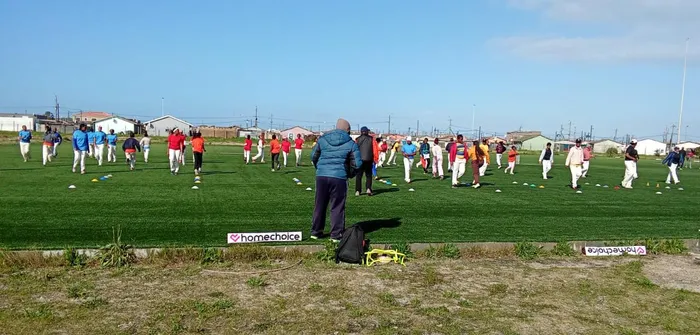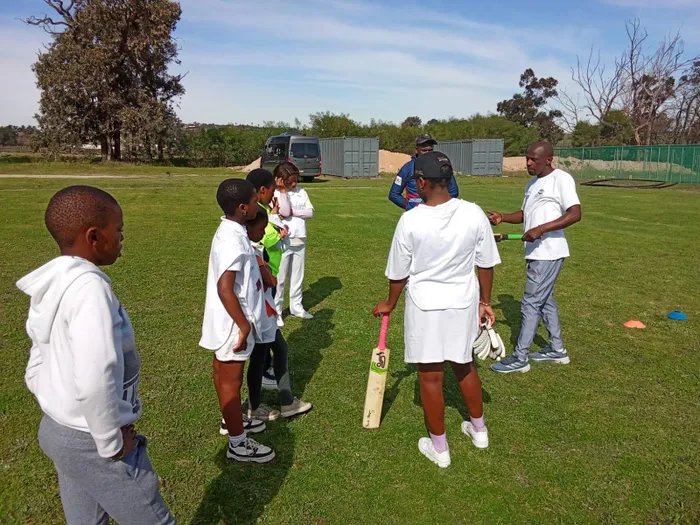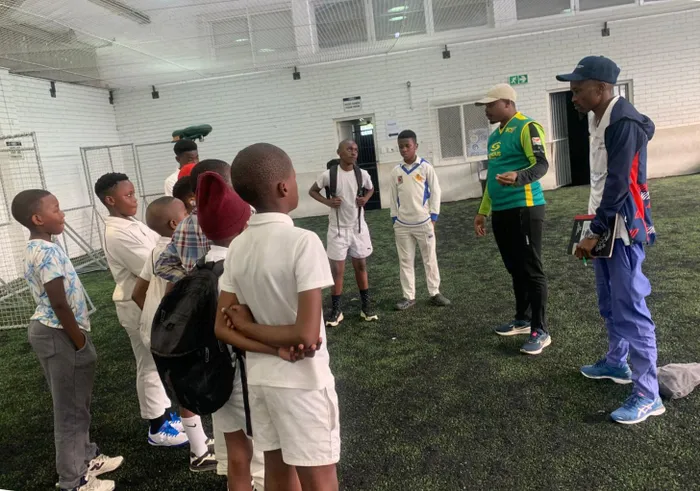New cricket body aims to boost township talent

Township coaches hard at work during one of the training sessions in Khayelitsha.
Image: Supplied
Cricket coach, Bulelani Libazi, and his team are moving to rewrite the script of cricket development in Cape Town’s townships and have emerged with a new cricket body to serve the townships.
He says they are not here to beg but to build.
The Township Cricket Coaches Association (TCCA) officially launched in June and is wasting no time in making its mark. Now TCCA is calling on the Western Province Cricket Association (WPCA) to recognise the work it’s already doing to fast-track township talent into mainstream cricket pathways.
At the forefront of this grassroots revolution is TCCA chairman Libazi, a respected figure in local cricket development circles. Elected as the association’s inaugural chairman, Libazi and his team hit the ground running, determined to create opportunities for both players and coaches where few previously existed.
“We’re not sitting around waiting for handouts,” said Libazi.
“We’ve always known there’s a gap between the haves and the have-nots in the game, and now we’re taking it upon ourselves to bridge that gap.”
The formation of TCCA was driven by a long-standing frustration with how township cricket has often been sidelined in broader provincial structures when it comes to development. Instead of waiting for formal intervention, the coaches in Khayelitsha are choosing to act.

The TCCA believe they have enough expertise to produce world class cricketers through the working relationship in the structure.
Image: Supplied
“When we launched in June, we elected a structure that includes past and present members who’ve long been involved in township cricket,” said Libazi.
“This is not a one-man show, this is a collective that’s pushing the real agenda: making sure our talent is recognised and properly developed.”
One of the TCCA’s progressions has been partnering with the Gary Kirsten Foundation, which has played a pivotal role in getting the project off the ground. According to Libazi, the association initially approached the foundation seeking tools of the trade, bats, pads, and training equipment, but what they received was even more powerful in terms of a long-standing partnership.
“Gary gave us the equipment to kickstart our initiative and we didn’t go to him asking for money, just for support, and they were more than happy to come on board,” said Libazi.
“That support also allowed us to enrol about 30 coaches into structured coaching programmes, with many now having certification that is equivalent to Cricket South Africa's (CSA) Level 1 coaching, the first step on the formal coaching ladder."
That level allows the coaches to take up coaching roles from all over the world.
The TCCA’s long-term vision is about more than just producing good cricketers; it’s about creating a sustainable system that opens doors. From scholarships at elite schools like Bishops, Rondebosch, and SACS, to representation in provincial and national squads, the aim is to prepare township talent to compete and thrive at the highest levels.
“We want to see our kids making their way into the South African Under-19 World Cup squads and not just as members, but as players good enough to make an impact,” says Libazi.
“That only happens if we build the right foundation, with proper coaching and support.”
That support has already started to come from outside the cricket world. The UWC Life Support team has stepped in to assist with transport logistics, ensuring that players and coaches can attend sessions, matches, and coaching clinics without the usual constraints of cost and distance.
Despite their early success, the TCCA is clear about what it needs next: recognition from the WPCA.

TCCA coaches Mangaliso Mtiya, centre, and Mzwethu Liwani address youngsters who are part of the newly-established Association's development programme.
Image: supplied
“We’re not asking for money. We’ve already shown we can do this ourselves, what we want is for the WPCA to officially recognise the structure,” Libazi said.“Their support would help us legitimise our structure, particularly when it comes to the coaching credentials of our members.”
Libazi says that WPCA’s recognition would allow the association to operate as a fully-fledged development partner, which would open up new pathways for funding, support and inclusion in official cricket calendars.
“There’s a clear gap between the union and township cricket clubs when it comes to development. That’s why we decided to have our own plan first to show that we’re serious and capable, before we approached them,” he says. “We’re ready to meet them halfway.”
What sets the TCCA apart from many well-meaning initiatives is its structure. By involving experienced voices from within the township cricket ecosystem, it has credibility and a clear purpose. Every decision made since its launch has been strategic, from coaching enrolments to community partnerships.
“Our association is built to last. It’s built by people who’ve been in this game for years, who understand what’s needed to take a young cricketer from Khayelitsha and surroundings and prepare them for a future in the sport,” says Libazi.
Related Topics: